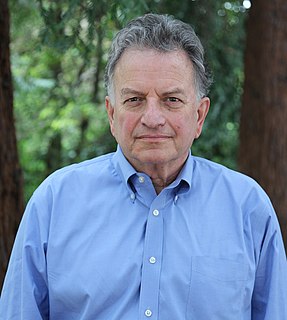
Hearst Communications, Inc., often referred to simply as Hearst, is an American multinational mass media and business information conglomerate based in the Hearst Tower in Midtown Manhattan, New York City.

Brett Ratner is an American film director and producer. He directed the Rush Hour film series, The Family Man, Red Dragon, X-Men: The Last Stand, and Tower Heist. He is also a producer of several films, including the Horrible Bosses series, The Revenant and War Dogs.
Vanity Fair is a monthly magazine of popular culture, fashion, and current affairs published by Condé Nast in the United States.
Michael Steven Ovitz is an American businessman, investor, and philanthropist. He was a talent agent who co-founded Creative Artists Agency (CAA) in 1975 and served as its chairman until 1995. Ovitz later served as President of The Walt Disney Company from October 1995 to January 1997.

Lowell Bergman is the Emeritus Reva and David Logan Distinguished Chair in Investigative Reporting at the Graduate School of Journalism at UC Berkeley and founder of the Investigative Reporting Program, where he taught lecture classes and then seminars dedicated to investigative reporting for 28 years. He was also a producer/correspondent for the PBS documentary series Frontline. Bergman’s career spans nearly five decades, most notably as a producer, a reporter and then the director of investigative reporting at ABC News and as a producer for CBS's 60 Minutes leaving in 1998 as the senior producer of investigations for CBS News. In 2019, Bergman retired after a 50-year career in journalism.

The Hollywood Reporter (THR) is an American digital and print magazine, and website, which focuses on the Hollywood film, television, and entertainment industries. It was founded in 1930 as a daily trade paper, and in 2010 switched to a weekly large-format print magazine with a revamped website. As of 2020, the day-to-day operations of the company are handled by Penske Media Corporation through a joint venture with MRC.
Peter Benton Bart is an American journalist and film producer, writing a column for Deadline Hollywood since 2015. He is perhaps best known for his lengthy tenure (1989–2009) as the editor in chief of Variety, an entertainment-trade magazine.

Channing Matthew Tatum is an American actor and producer. Tatum made his film debut in the drama film Coach Carter (2005). His breakthrough role was in the 2006 dance film Step Up, which introduced him to a wider audience.

Peter Chernin is an American businessman and investor. He is the chairman and CEO of The Chernin Group (TCG), which he founded in 2010. TCG manages, operates and invests in businesses in the media, entertainment, and technology sectors. Specifically, the company focuses on three areas: making investments in technology and media companies in the US, developing premium content for film and television, and capitalizing on strategic business opportunities in emerging markets.

Backstage is an entertainment-industry brand aimed at people working in film and the performing arts, with a special focus on casting, job opportunities, and career advice.
Amy Beth Pascal is an American business executive and film producer. She served as the Chairperson of the Motion Pictures Group of Sony Pictures Entertainment (SPE) and Co-Chairperson of SPE, including Sony Pictures Television, from 2006 until 2015. She has overseen the production and distribution of many films and television programs, and was co-chairperson during the late-2014 Sony Pictures hack.
Lindsay Chaney is a senior news editor at Variety.

MRC is an American media company owned by Eldridge Industries. Founded by Mordecai (Modi) Wiczyk and Asif Satchu as an independent film studio, the company funds and produces film and television programming, and owns a group of entertainment and music industry publications. In 2018, the company merged with Todd Boehly's media assets under Valence Media, with the company as a whole taking on the MRC name in 2020.

Billboard is an American music and entertainment magazine published weekly by the Billboard-Hollywood Reporter Media Group, a division of MRC Media & Info. The magazine provides music charts, news, video, opinion, reviews, events, and style related to the music industry. Its music charts include the Hot 100, Billboard 200, and Global 200, tracking the most popular albums and songs in different genres of music. It also hosts events, owns a publishing firm, and operates several TV shows.

Relativity Media is an American media company founded in 2004 by Lynwood Spinks and Ryan Kavanaugh. The company brokered film finance deals and later branched into film production and other entertainment ventures. The company was commercially successful prior to bankruptcy.

Variety is an American media company owned by Penske Media Corporation. The company was founded by Sime Silverman in New York City in 1905 as a weekly newspaper reporting on theater and vaudeville. In 1933 it added Daily Variety, based in Los Angeles, to cover the motion-picture industry. Variety.com features entertainment news, reviews, box office results, cover stories, videos, photo galleries and features, plus a credits database, production charts and calendar, with archive content dating back to 1905.
Penske Media Corporation (PMC) is an American digital media, publishing, and information services company based in Los Angeles and New York City. It publishes more than 20 digital and print brands, including Variety, Rolling Stone, WWD, Deadline Hollywood, Bollywood Life, Boy Genius Report, and others. PMC's Chairman and CEO since founding is Jay Penske.
Prometheus Global Media was a New York City-based B2B media company. The company was formed in December 2009, when Nielsen Company sold its entertainment and media division to a private equity-backed group led by Pluribus Capital Management and Guggenheim Partners. Guggenheim acquired Pluribus's stake in the company in January 2013, giving it full ownership under the division of Guggenheim Digital Media.

Ryan Kavanaugh is an American film financier. He co-founded and served as CEO of Relativity Media, where he brokered deals between Wall Street investors and major film studios. He credited his risk assessment algorithm with Relativity Media's initial success. After Relativity Media filed for bankruptcy, he stepped down as CEO and faced several lawsuits regarding his management. He later founded Proxima Media, which acquired a controlling stake in Triller.
First-dollar gross is a practice in filmmaking in which the participant receives a percentage of the gross box office revenue starting from a film's first day of release. The participant begins sharing in the profits from the first ticket sale, not waiting until the film studio turns a profit. It is a film finance and distribution term used primarily in the United States film industry. In France, as of September 2003, one condition for filmmakers to get government support is that money must be reimbursed on the first-dollar gross basis. First-dollar gross has become a rare arrangement, and compensation has increasingly shifted away from first-dollar gross to back-end compensation. Some contracts define "first dollar" as a net figure after certain expense deductions rather than a true distributor's gross.











